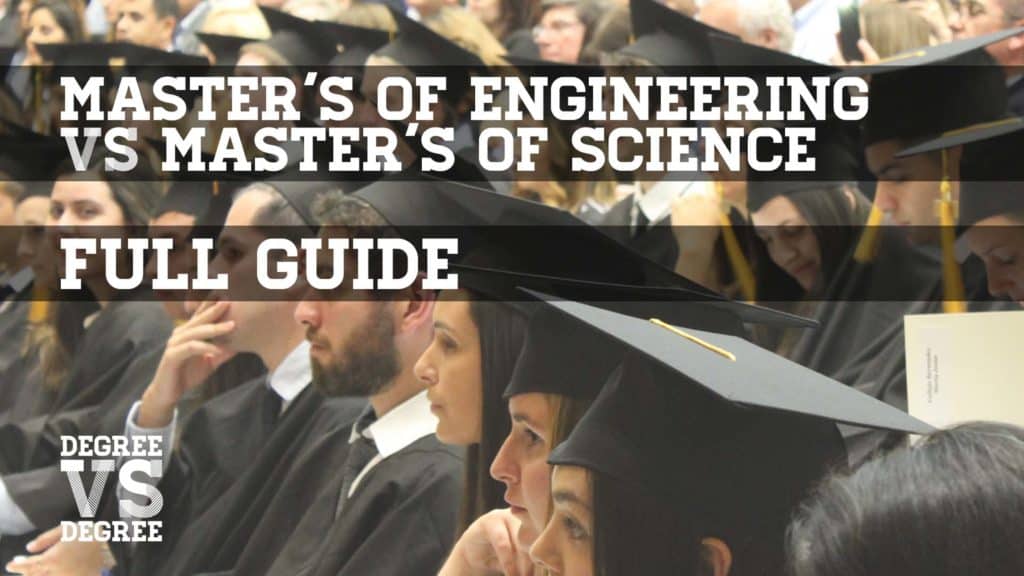Whenever you are choosing between a master of engineering vs master of science, the choice becomes important because it would decide what you want to do with your career in the future. Choosing any of these paths will open up a plethora of career opportunities. The one main difference between the two is such — a master of engineering degree would have a lot of course work, while a master of science degree would entail a lot of research work.
Having said that, you will soon find out that both these courses are a mix of both research and course work. They will never be completely classroom or practical based.
To further your engineering career, one of the most accelerated ways to increase your salary and career opportunities. Let us take a look at both to understand the main difference when it comes to masters of science vs masters of engineering.
Master of Engineering
If you have a bachelor’s degree in engineering, there are many universities that offer a master’s degree in engineering. This is to prepare graduates with technical preparation for related field practice. If you are planning to prepare for a PhD program in the future, this degree may not prepare you for it because you will be spending more time on course work rather than research.
This type of course also sometimes allows the student to take up several other courses (with the approval of graduation committees) such as other engineering courses, policy, business or even computer sciences. Typically, a student can complete their degree requirements in 2 semesters. Some colleges may require their students to prepare a paper based on a particular engineering project before they graduate.
Since this degree necessarily does not include a thesis, it may be completed in a shorter time when compared with a master of science degree. Students pursuing a master of engineering course do not receive any type of financial support.
How Long to Complete Master of Engineering?
The master of engineering course is designed to be completed in 2 years but not everyone finishes it in that duration. A lot of people who are also working at the same time may take as long as 3 years to complete the course. But on the other hand, students can also opt for an accelerated course like this one and finish their courses in less than 2 years, but expect the workload to be nothing short of intense!
Then there are integrated programs wherein they are combined at the undergraduate level and go on for 4 years, but those are more common in Europe.
Master of Science
 A lot of colleges offer a master of science program in a variety of fields including mechanical or electrical engineering or (engineering management). This degree is usually considered to be a research-oriented degree, and those who wish to pursue a PhD, this course is more suitable because it puts a lot of emphasis on research. A thesis is usually required for the completion of this course.
A lot of colleges offer a master of science program in a variety of fields including mechanical or electrical engineering or (engineering management). This degree is usually considered to be a research-oriented degree, and those who wish to pursue a PhD, this course is more suitable because it puts a lot of emphasis on research. A thesis is usually required for the completion of this course.
Profession wise, both degrees are looked upon favorably in the engineering field, and employment can be obtained both in the government, private and consulting sector. Compared with the master of engineering course, students of the master of science course may receive financial aid in the form of a graduate research assistantship or graduate teaching assistantship.
How Long to Complete Master of Science?
Just like other masters degree programs, the master of science course also takes 2 years to complete, while some schools such as this allow the courses to be available through long-distance learning (which allow the students to complete the course at their own pace) and earlier if they so wish.
Other universities also allow this part time, and the course duration can be as long as 3-5 years to complete a 45-unit requirement.
Requirements for Enrollment
The admission requirements for masters of science vs masters of engineering are mostly the same. Broadly speaking, both of them require 3 letters of recommendation and GRE (Graduate Record Examinations) scores. Here are some basic requirements for enrollment in both courses:
GRE
This is a must and applies to everyone wanting to enroll in the programs. All universities will ask for your GRE test score. This is an admission requirement.
Bachelor’s Degree
The applicant must have a bachelor’s degree from an accredited university or college in the United States.
Proficiency in English
If English is not your native language, you must prove your English language skills by submitting TOEFL scores. You may also refer to the specific college’s requirements.
Apart from these basic requirements, different universities and departments may have other specific requirements which should be checked beforehand.
Average Cost of Masters of Engineering vs Masters of Science
The average cost of both the courses would vary depending on the location of the university. The fees may range from $9,500 to $47,000 (approximately), depending upon where the university is located, among other factors. Engineering students may also receive a grant and free scholarships, stipends, annual allowances and even full tuition assistance. Students should also find out if they are eligible for certain fee waivers that may differ from student to student.
Average Salaries
The question of how much you will earn as an engineer may depend upon several factors that include the school you attended, your education level and the engineering stream you have pursued. Still, engineering graduates tend to make a tidy sum.
Pay levels may start at as much as $62,000 (annually) and may go up to $120k, or much higher. Some highest-paid engineering jobs include:
- Aerospace Engineers
- Computer Engineers
- Petroleum Engineers
- Electrical Engineers
- Nuclear Engineers
- Civil Engineers
The salaries, would, of course, depend upon the company and where you are placed. There could be disparities in salaries depending upon what your specialization is, and the country of your employment as well.
The Final Word
Hopefully, this article was able to convince you that both these programs are great and it depends entirely upon you where your area of interest lies. If you are more research oriented than most, then a master of science degree is what you should go for. If you don’t want to dilly-dally and start work as soon as you complete your education, a master of engineering course is what you should opt for.

